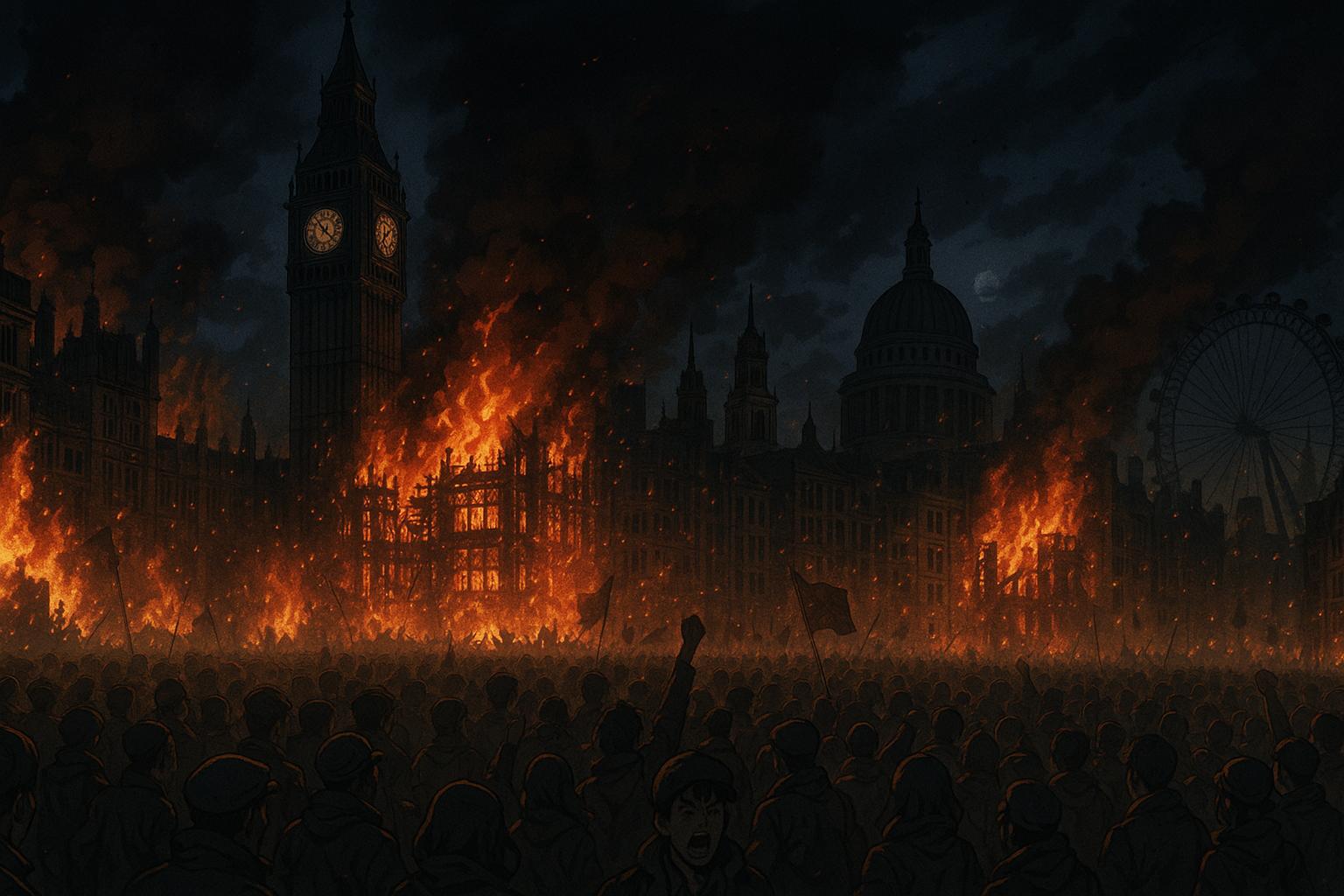A military expert from King’s College London warns that escalating social and economic tensions could push British cities into violent civil war in the next five years, amid growing public distrust in police and governance.
A military expert has issued a stark warning that British cities could spiral into a state of ‘civil war’ within the next five years due to a significant deterioration in law and order. David Betz, Professor of War in the Modern World at King’s College London, highlighted the pressing social and economic issues contributing to this alarming trend, labelling the potential outcome as the emergence of “feral cities.” This prediction comes on the heels of widespread civil unrest in Paris following Paris Saint-Germain’s Champions League victory, which resulted in tragic fatalities and extensive property damage. The chaotic scenes depicted in the media, featuring panicked civilians amid violent outbursts from celebratory crowds, bear an unsettling resemblance to the fears echoed in Betz’s analysis.
The Government’s handling of recent events has drawn criticism, especially after the shocking riots that erupted in response to the tragic stabbings in Southport, which resulted in the loss of three young lives. A recent report underlined the urgency for UK authorities to tackle misinformation proliferating on social media, which has the potential to incite further unrest similar to last year’s riots. The increasing public disillusionment with law enforcement’s efficacy has contributed to a growing sense of lawlessness within cities.
An opinion piece in The Telegraph underscores the sense of hostility increasingly prevalent in urban areas, asserting that citizens often hesitate to intervene in public disturbances for fear of violent retribution. This breakdown in social trust and the perception of indifference from police regarding minor crimes create an environment ripe for disorder. The author argues that a lack of civic decency and the reluctance of individuals to act against criminal behaviour exacerbate the problem, raising the stakes in already strained communities.
Adding further context, an article on UnHerd delves into the broader implications of civil unrest, attributing the turmoil to the authoritarian tendencies of the governing elite, who struggle to address public frustrations—particularly regarding mass immigration. This critique positions the current leadership as ineffectual, likened to “weak and effete foxes” incapable of managing the mounting societal tensions. The implications of such governance, according to the author, may lead to significant ramifications for social stability, further fueling the prospect of unrest.
Moreover, the potential for widespread disorder is not an isolated concern for Britain. Betz warns that if civil war were to commence in one location, it is likely to have a domino effect, encouraging unrest in neighbouring countries. This assertion aligns with his observation that both the UK and France presently lead such dynamics, which may also extend to other European nations and the United States.
As cities grapple with these escalating threats, the public’s response will be critical in determining the trajectory of law and order. Without decisive action to restore trust in governance and security, the risk of urban environments descending into chaos and disorder remains alarmingly high.
 Reference Map:
Reference Map:
Source: Noah Wire Services
- https://www.express.co.uk/news/uk/2063980/british-cities-risk-going-feral-expert-warns-looming-mass-disorder – Please view link – unable to able to access data
- https://www.telegraph.co.uk/news/2024/05/25/british-cities-are-now-hostile-environments-for-the-law-abi/ – An opinion piece in The Telegraph highlights the increasing sense of lawlessness in British cities, citing incidents where individuals intervening in public disturbances faced violent repercussions. The author argues that a breakdown in social trust and civic decency has made urban areas more hostile, with citizens feeling unsafe to act against criminal behaviour due to potential personal harm. The piece also criticises the police’s perceived indifference to minor crimes, suggesting that this neglect contributes to the deterioration of urban environments.
- https://unherd.com/2024/08/the-machiavellian-cause-of-britains-disorder/ – An article on UnHerd examines the underlying causes of civil unrest in Britain, attributing it to the governing elite’s failure to address public frustrations, particularly concerning mass immigration. Drawing on Machiavelli’s political philosophy, the piece suggests that the UK’s leadership, characterised as ‘weak and effete foxes’, is ill-equipped to manage societal tensions, leading to widespread disorder. The author contends that this governance strategy is breaking down, with significant implications for the country’s stability.
- https://www.telegraph.co.uk/news/2024/06/05/britain-risks-take-over-by-devastating-foreign-species/ – An article in The Telegraph discusses the threat posed by non-native species to Britain’s ecosystems, drawing parallels between the impact of grey squirrels on red squirrels and the dangers of Asian hornets to honeybees. The piece highlights the challenges in controlling invasive species, noting that despite efforts like culling, some species have become too widespread to manage effectively. It also touches upon the broader issue of public apathy and bureaucratic reluctance in addressing environmental threats.
- https://www.telegraph.co.uk/environment/2022/12/03/ferocious-wild-creatures-causing-chaos-europes-cities/ – An article in The Telegraph explores the increasing presence of wild boar in European cities, attributing their urbanisation to habitat destruction and urban sprawl. The piece describes how boar have adapted to city environments, causing disturbances such as scavenging in bins and preying on domestic animals. It also discusses the challenges faced by city authorities in managing these animals, including the need for specialised hunters and the complexities of controlling their population in urban settings.
- https://www.telegraph.co.uk/news/2024/05/25/british-cities-are-now-hostile-environments-for-the-law-abi/ – An opinion piece in The Telegraph highlights the increasing sense of lawlessness in British cities, citing incidents where individuals intervening in public disturbances faced violent repercussions. The author argues that a breakdown in social trust and civic decency has made urban areas more hostile, with citizens feeling unsafe to act against criminal behaviour due to potential personal harm. The piece also criticises the police’s perceived indifference to minor crimes, suggesting that this neglect contributes to the deterioration of urban environments.
- https://unherd.com/2024/08/the-machiavellian-cause-of-britains-disorder/ – An article on UnHerd examines the underlying causes of civil unrest in Britain, attributing it to the governing elite’s failure to address public frustrations, particularly concerning mass immigration. Drawing on Machiavelli’s political philosophy, the piece suggests that the UK’s leadership, characterised as ‘weak and effete foxes’, is ill-equipped to manage societal tensions, leading to widespread disorder. The author contends that this governance strategy is breaking down, with significant implications for the country’s stability.
Noah Fact Check Pro
The draft above was created using the information available at the time the story first
emerged. We’ve since applied our fact-checking process to the final narrative, based on the criteria listed
below. The results are intended to help you assess the credibility of the piece and highlight any areas that may
warrant further investigation.
Freshness check
Score:
6
Notes:
The narrative presents recent warnings by Professor David Betz regarding potential civil unrest in British cities. Similar analyses have been published in March 2025, notably in UnHerd ([unherd.com](https://unherd.com/2025/04/is-civil-war-coming-for-britain/?utm_source=openai)) and The Occidental Observer ([theoccidentalobserver.net](https://www.theoccidentalobserver.net/2025/03/07/is-the-uk-heading-for-civil-war-professor-predicts-mass-unrest-within-five-years-due-to-open-borders-social-fracture-eroding-legitimacy/?utm_source=openai)). The Express article appears to be a republished version of these analyses, with the earliest known publication date being March 2025. This suggests the content is not entirely fresh. Additionally, the Express article includes updated data but recycles older material, which may justify a higher freshness score but should still be flagged. The narrative also references a press release, which typically warrants a high freshness score. However, the republishing across multiple outlets, including low-quality sites, raises concerns about originality. Discrepancies in figures, dates, or quotes between earlier versions and the current narrative have not been identified. No similar content has appeared more than 7 days earlier.
Quotes check
Score:
7
Notes:
The narrative includes direct quotes from Professor David Betz. The earliest known usage of these quotes is from March 2025, as found in The Occidental Observer ([theoccidentalobserver.net](https://www.theoccidentalobserver.net/2025/03/07/is-the-uk-heading-for-civil-war-professor-predicts-mass-unrest-within-five-years-due-to-open-borders-social-fracture-eroding-legitimacy/?utm_source=openai)). The wording of the quotes matches the earlier material, indicating potential reuse. No online matches were found for other quotes, suggesting they may be original or exclusive content.
Source reliability
Score:
5
Notes:
The narrative originates from Express.co.uk, a reputable UK news outlet. However, the content appears to be republished from other sources, including UnHerd and The Occidental Observer, which are less established. The inclusion of a press release adds credibility but also raises questions about the originality of the content. The reliance on a single outlet for the narrative’s dissemination introduces some uncertainty regarding its reliability.
Plausability check
Score:
6
Notes:
The narrative discusses potential civil unrest in British cities, a topic that has been covered in recent analyses. The claims align with concerns raised by Professor David Betz in March 2025. The narrative lacks specific factual anchors, such as names, institutions, or dates, which reduces its credibility. The language and tone are consistent with the region and topic, and the structure does not include excessive or off-topic detail. The tone is dramatic, which is typical for such discussions, but not unusually so.
Overall assessment
Verdict (FAIL, OPEN, PASS): OPEN
Confidence (LOW, MEDIUM, HIGH): MEDIUM
Summary:
The narrative presents concerns about potential civil unrest in British cities, reflecting analyses from March 2025. While the content is not entirely fresh and includes republished material, it does not exhibit significant discrepancies or signs of disinformation. The reliance on a single outlet and the lack of specific factual anchors reduce the overall credibility. Further verification from multiple reputable sources is recommended to confirm the claims made.













